武汉大学比较文学与世界文学复试经验分享
复试文学知识点总结

复试文学知识点总结文学是人类文明的重要组成部分,它反映了社会、历史和人类内心世界的丰富多彩。
复试文学知识点总结旨在对学生的文学素养进行科学评价,考察他们对文学作品的理解、分析和创作能力。
本文将从文学史、文学理论、文学流派、文学作品等方面对复试文学知识点进行深入总结,以期帮助考生全面了解和掌握相关知识,更好地备战复试。
一、文学史文学史是文学发展历程的总结与反思,它可以帮助我们了解不同时期、不同地域文学的特点和流变。
复试文学知识点中,考察文学史的范围较广,可能包括中国古代文学史、中国现当代文学史、外国文学史等多个方面。
在准备文学史方面的复试知识时,考生需要牢固掌握各个时期的文学特点、代表作品、主要流派等内容,为了更好地背诵和复盘这些内容,建议可以结合相关名家讲解、文学史著作进行学习。
例如,《中国古代文学史》(林庆发著、人民文学出版社)、《中国现当代文学史》(龚巍著、人民文学出版社)、《外国文学史》(茅盾、李汉、朱伟著、上海三联书店)等书籍,通过系统、全面的阅读,将有效助力复试准备。
二、文学理论文学理论是对文学现象进行深刻思考的产物,它能够在一定程度上揭示文学现象的本质和规律性。
在复试中,文学理论是比较重要的知识点,需要考生深刻理解不同理论流派的内涵和论点,常见的文学理论范畴有:马克思主义文学理论、民族文学理论、女性主义文学理论、后殖民理论、后现代文学理论等。
为了更好地应对相关问题,考生需要系统学习相关理论,并能熟练掌握其重要观点和典籍,比如《文艺理论大纲》(王蒙、人民文学出版社)、《文艺理论》(茅盾等、人民文学出版社)等书籍,进一步了解和理解相关理论,将有助于应对复试时的相关问题。
三、文学流派文学流派是文学发展中的不同创作方向或文学思潮的代表,了解不同的文学流派有助于理解不同文学作品的风格和特点。
复试文学知识点中,文学流派也是一个重要内容,包括浪漫主义、现实主义、自然主义、象征主义、新感觉派等。
考生需要掌握各个流派的产生背景、主要特点、代表作品等内容,并能够举一反三,理解和分析不同文学流派对文学创作和文学现象的影响。
比较文学复试资料

比较文学复试资料
比较文学作为一门交叉学科,涉及到文学、文化、语言、历史、社会等多个领域,因此在复试过程中需要准备充分。
以下是比较文学复试所需的资料:
1. 重要文学作品:需要了解世界文学中的重要作品,包括但不
限于《哈姆雷特》、《鲁滨逊漂流记》、《福尔摩斯探案全集》、《现代汉语词典》等。
2. 重要文学流派:需要了解文学史上的重要流派,包括但不限
于现实主义、浪漫主义、自然主义、象征主义等。
3. 重要文学批评家:需要了解文学批评史上的重要人物,包括
但不限于弗洛伊德、巴赫金、布尔迪厄等。
4. 重要文学理论:需要了解文学理论中的重要概念,包括但不
限于意识流、后殖民主义、文化批评等。
5. 学科交叉知识:需要了解比较文学与其他学科的交叉知识,
包括但不限于语言学、哲学、历史、社会学等。
6. 研究方法:需要了解比较文学的研究方法,包括但不限于文
本分析、文化批评、比较方法等。
以上是比较文学复试所需的主要资料,需要考生认真准备并掌握,以便在面试中能够更好地展现自己的知识水平和学术能力。
- 1 -。
2016年武汉大学文学院硕士研究生复试名单公示

2016年武汉大学文学院硕士研究生复试名单公示初试成绩占70%,复试成绩占30%。
复试成绩中专业课笔试成绩占10%,综合面试成绩占15%,外语听力口语测试成绩占5%。
总评成绩计算公式:(初试总分/5)×70%+专业课笔试成绩×10%+综合面试成绩×15%+外语听力口语测试成绩×5%。
以下为东湖武大考研网整理收集的2016年武汉大学文学院硕士研究生复试名单,如有其他考研疑问可以联系右侧的咨询老师。
序号姓名报考专业外语政治业务课1业务课2总分复试结果1余梦月写作学5979137131406录取2陈韬写作学7275119120386录取3鲁钊宇对外汉语教学8075144129428录取4周冰对外汉语教学7175136135417录取5葛萌对外汉语教学7668139128411不录取6徐远昭比较文学与世界文学7974129116398录取7朱世霞比较文学与世界文学8374111129397录取8胡鹏飞比较文学与世界文学7877114123392录取9王思齐比较文学与世界文学5664135124379录取10王昕比较文学与世界文学6871114126379录取11朱钰婷比较文学与世界文学6866119124377录取12刘晓晨比较文学与世界文学6771121118377不录取13刘蓉中国现当代文学7880113129400录取14贺慎中国现当代文学6469121123377录取15龚映月中国现当代文学6772120118377不录取16王环中国古代文学7169118127385不录取17张淑婷中国古代文学7277116116381录取18许风杰中国古典文献学8868125122403录取19贺骞琪中国古典文献学7567123121386录取20胡文君中国古典文献学7267113123375不录取21钟琦汉语言文字学7068139142419录取22李振汉语言文字学7276134131413录取23张明珠汉语言文字学7076133134413录取24郝媛汉语言文字学7180125133409录取25熊凤汉语言文字学6874129137408录取26吴文超汉语言文字学7868136125407录取27陈琪汉语言文字学6770134129400不录取28周杨帆汉语言文字学7668125128397不录取29丁岑语言学及应用语言学8277132133424录取30吕清林语言学及应用语言学7271132127402录取31张钰莹语言学及应用语言学7069133128400录取32建朋飞语言学及应用语言学6867132129396不录取33马可雅文艺学6461123135383录取34刘宁涛文艺学6375115129382录取35黄凯伦文艺学6881119108376录取36高斯逸汉语国际教育6972143139423录取37张曦汉语国际教育6876144132420录取38雷金瑾汉语国际教育8176141122420录取39方婷汉语国际教育8264128131405录取40董一睿汉语国际教育7369139121402录取41黄玲汉语国际教育7174136121402录取42王雨汉语国际教育7271143115401录取43程宇汉语国际教育7274135120401录取44李莉汉语国际教育7376131121401专项计划录取45杨莉汉语国际教育6878135120401录取46熊蕾汉语国际教育7364144119400录取47高羽欢汉语国际教育7375135117400录取48张盼杰汉语国际教育6975144111399录取49贾方汉语国际教育6765129137398录取50徐敏汉语国际教育6763136130396录取51吴叶莉汉语国际教育7573135112395录取52黄丽娟汉语国际教育7072135116393录取53罗秋雅汉语国际教育7067138117392不录取54金亚红汉语国际教育7272132116392不录取55鲁晓琴汉语国际教育6369143116391录取56肖可汉语国际教育8375117112387录取57刘纯汉语国际教育6566136118385不录取58吴莹莹学科教学(语文)7273118129392录取59桂泳学科教学(语文)6870110135383录取60刘称学科教学(语文)6668124120378录取61江姝学科教学(语文)6666120120372专项计划录取62李昊学科教学(语文)6271121114368不录取【专业课不再难】专业课自主命题,信息少,没教材,真题难,怎么办?武汉大学考研初试成绩占到总评成绩的50%~70%的成绩,其中专业课成绩占分比重最大,也是考生之间拉开差距的关键,东湖武大考研网推出专业课一对一通关班,一个对策解决初试专业课遇到的所有问题,你离武大只有一个通关班的距离!文章摘自东湖武大考研网!。
湖北分中心比较文学与世界文学班级讨论总结

湖北分中心比较文学与世界文学班级讨论总结2009年9月26日下午,精品课程网络师资培训湖北分中心“比较文学与世界文学”班级围绕国家中心开列的五个讨论题,展开了热烈、深入、广泛的交流讨论。
培训中心不时传出爽朗的笑声。
在轻松、和谐的气氛中,各位教师结合自己的教学、研究经验,本着“广泛切磋,立足提高”的原则,纷纷畅谈了自己的看法。
通过这次讨论,我们对孙景尧教授、蒋承勇教授和陈纳教授等专家们的丰富的培训内容有了更切实的体悟和印证。
专家传授的精品教学思想经过我们讨论中细致的反刍回味,尤其显得意味深长、滋养无穷。
这对于我们未来的课程教学和学科建设是非常有意义的。
现就本班讨论内容总结汇报如下:针对“如何在外国文学教学中恰当的引入和运用文学批评的新方法?”这第一个问题,本班的学员普遍认为,为了开拓研究视野,丰富作品的多元意蕴,本学科的教学必须在传统的社会历史批评方法之外,积极探索、采用其他更有启发性的研究视角。
一方面是为了避免单调、机械、片面的阐释,培养学生的思考能力、知识迁移能力以及主动学习的兴趣;另一方面,也是在启发学生:一个开放的文本,其意义系统是通过作者和读者共同建构的。
文本话语的原始意义与读者在丰富暗示之下的创造性阐释在很大程度上确立了一个文本的经典性。
当然,“怎么引入和运用这些新方法”,必须注意防止“阐释过度”和“主体价值判断的缺失”这两个弊病。
如不问合适与否,生硬套用新方法,自以为站在学术前沿,沾沾自喜、自鸣得意,则必将走进阐释误区。
这与抱残守缺、只图方便、阐释一元一样,都是思想懒惰病的表现。
而且,教师无论引入多少新方法、新观点,必须有自己的价值判断或比较辨证的评价。
例如,讲歌德的《浮士德》,当谈到它是欧洲几百年优秀思想文化的总结时,必须强调它的时代性。
针对浮士德围湖造田,一方面结合时代背景,肯定其中资产阶级的进取精神,另一方面可引入当下生态美学(科学发展)的观点对工业革命以来“人类中心主义”的发展思维作适当的批评。
武汉大学——比较文学与世界文学专题2001年博士研究生入学考试试题
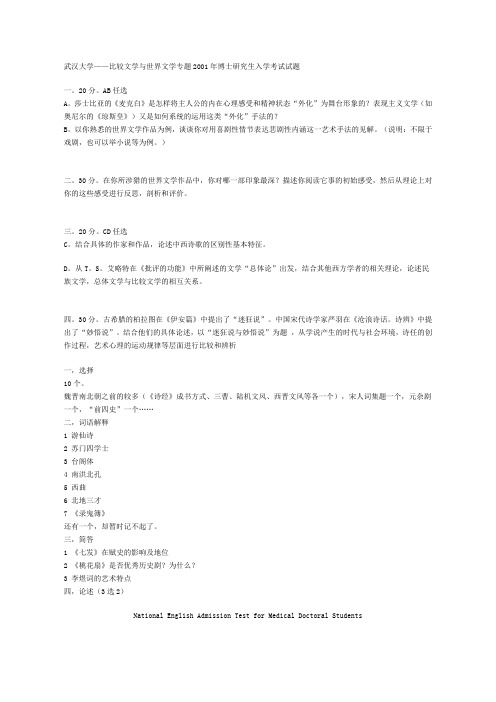
武汉大学——比较文学与世界文学专题2001年博士研究生入学考试试题一。
20分。
AB任选A。
莎士比亚的《麦克白》是怎样将主人公的内在心理感受和精神状态“外化”为舞台形象的?表现主义文学(如奥尼尔的《琼斯皇》)又是如何系统的运用这类“外化”手法的?B。
以你熟悉的世界文学作品为例,谈谈你对用喜剧性情节表达悲剧性内涵这一艺术手法的见解。
(说明:不限于戏剧,也可以举小说等为例。
)二。
30分。
在你所涉猎的世界文学作品中,你对哪一部印象最深?描述你阅读它事的初始感受,然后从理论上对你的这些感受进行反思,剖析和评价。
三。
20分。
CD任选C。
结合具体的作家和作品,论述中西诗歌的区别性基本特征。
D。
从T。
S。
艾略特在《批评的功能》中所阐述的文学“总体论”出发,结合其他西方学者的相关理论,论述民族文学,总体文学与比较文学的相互关系。
四。
30分。
古希腊的柏拉图在《伊安篇》中提出了“迷狂说”。
中国宋代诗学家严羽在《沧浪诗话。
诗辨》中提出了“妙悟说”。
结合他们的具体论述,以“迷狂说与妙悟说”为题,从学说产生的时代与社会环境,诗任的创作过程,艺术心理的运动规律等层面进行比较和辨析一,选择10个。
魏晋南北朝之前的较多(《诗经》成书方式、三曹、陆机文风、西晋文风等各一个),宋人词集题一个,元杂剧一个,“前四史”一个……二,词语解释1 游仙诗2 苏门四学士3 台阁体4 南洪北孔5 西曲6 北地三才7 《录鬼簿》还有一个,却暂时记不起了。
三,简答1 《七发》在赋史的影响及地位2 《桃花扇》是否优秀历史剧?为什么?3 李煜词的艺术特点四,论述(3选2)National English Admission Test for Medical Doctoral StudentsPAPER ONEPart I ListeningSection A ºDirections: In this section of the test, you will hear 15 short conversations between two speakers.At the end of each conversation, a question will be asked about what was said. The conversations a nd questions will be read only once. You must listen carefully and choose the right answer from th e four choices marked A, B, C and D. Mark your answer on the ANSWER SHEET.For Example: A B D1. A. John is good at painting.B. John’s sister’s son is good at painting.C. The woman suggest the man take up painting.D. The woman is making fun of the man.2. A. He has a fried who majored in economics.B. He hasn’t taken mo re than one economics course.C. He’s been learning a lot this year, too.D. He couldn’t make any sense out of his course.3. A. Check the price of calculators. B. Finish his statistics homework.C. Look for a job in mathematics.D. Use a smaller calculator.4. A. Because the police stopped him. B. Because the driver charged too much.C. Because he had been robbed.D. For no good reason.5. A. Take some more vegetables. B. Pass the woman the meat.C. Avoid taking any more food.D. Help to prepare the potatoes.6. A. In her office. B. In the library.C. In the laboratory.D. In the conference room.7. A. Professor Miller offered more help than he had expected.B. Professor Miller will not discuss the topic with him.C. He asked Professor Miller for some books.D. Professor Miller gave him more books than he had requested.8. A. She thinks the explanations are difficult.B. The explanations will be added in a later edition.C. She thinks the book should include more information.D. The book includes an explanation of all the answers.9. A. He probably supports nuclear power plants.B. He probably opposes nuclear power plants.C. He probably no opinion on this topic.D. He probably tries to understand both sides.10. A. Use every minute of their time wisely.B. Live there until the final time.C. Finish their assignments early if possible.D. Save the lab samples.11. A. She is dependable. B. She is hard-working.C. She is kind.D. She is helpful.12. A. It made her ill.B. She believes the refreshments could have been better.C. She feels regret about the lack of success.D. She felt that her clothes were inappropriate.13. A. She likes to get E-mails.B. She hasn’t seen her friends just lately.C. She lives in the same house with the man and woman are talking.D. She is their best friend.14. A. He doesn’t need a green pen.B. He never bought a green pen.C. He never returned the woman’s green pen to her.D. He doesn’t have a green pen with him.15. A. Bill will buy the car as soon as he gets the money.B. Bill’s friend is buying the car from him.C. Bill can’t afford to buy a new car.D. Bill has already made the down payment on the car.Section B ºDirections: In this section of the test, you will hear three talks. After each talk, there are fiv e questions. The talks and questions will be read only once. You must listen carefully and choose the right answer from the four choices marked A, B, C and D. Mark your answer on the ANSWER SHEET.For Example: A B DTalk One16. A. A nutritionist. B. A professor.C. A dining hall manager.D. A doctor.17. A. A note for his doctor. B. A dining hall pass.C. A list of restaurants.D. A food chart.18. A. He’s an athlete. B. He has high blood pressure.C. He has a high cholesterol level.D. He’s overweight.19. A. In the hospital cafeteria. B. In his room.C. In restaurants.D. In the dining hall.20. A. Angry. B. Hungry.C. Relieved.D. Tired.Talk Two21. A. Fire prevention. B. Pest control.C. House construction.D. Toxic chemicals.22. A. It’s cheaper. B. It’s safer.C. It’s quicker.D. It’s readily available.23. A. To keep the heat inside.B. To prevent insects from escaping.C. To reduce the risk of fire.D. To keep the wood dry.24. A. To show that the treatment will not cause fire.B. To emphasize the dangers of the old method.C. To explain a step in the new technique.D. To illustrate a compromise between old and new systems.25. A. Above 125 degrees Centigrade. B. About 50 degrees Centigrade.C. Around 65 degrees Centigrade.D. At 80 degrees Centigrade.Talk Three26. A. Read and commented on the proposed topics.B. Had conferences with some students.C. Returned the topic papers to her students.D. Realized their research papers are due in six weeks.27. A. A recent textbook assignment. B. Requirements for the final examination.C. Choosing research topics.D. Preparing an outline for a paper.28. A. Immediately. B. The following week.C. In two weeks.D. At the end of the semester.29. A. To present final papers. B. To give a model of outline style.C. To discuss the preliminary outline.D. To discuss final grades.30. A. With a thesis statement. B. With a list of references.C. With a summary of the conference.D. With the student’s name.Part II Vocabulary (10%)Section ADirections: In this section all the sentences are incomplete. Four words or phrases, marked A, B, C and D, are given beneath each of them. You are to choose one word or phrase that best completes the sentence. Then, mark your answer on the ANSWER SHEET.31.The fact is, doctor, I just can't _____ this dreadful cough.A. get out ofB. get rid ofC. get down toD. get round to32. After eight hours at the wheel of the lorry, the driver was beginning to feel the _______.A. nervousnessB. tensionC. strainD. extension33. The Chinese government is determined to ____ the established policy of developing agriculture.A. go afterB. go byC. go aheadD. go on34. The Manager has asked to see the sales _____ resulting from our recent advertising campaign.A. numbersB. figuresC. amountsD. quantities35. The local medical officer reported a serious _____ of food-poisoning.A. stateB. incidentC. outbreakD. event36. They didn’t know how to put in a central-heating system, but they managed it by trial and ___ __.A. blunderB. slipC. errorD. mistake37.I was going to say something about the matter; but _____ I gave it up.A. on second thoughtsB. on the wholeC. at the thought ofD. on second thought38. Even if it is a cold day, I think cool water looks _______.A. invitingB. distastefulC. disgustingD. repulsive39. The man’s face was _______ from his infected tooth despite his visit to the dentist.A. bulgingB. swollenC. dilatedD. expanded40. Similar ethical questions ______ as advances are made in such areas as organ transplant andfetal in utero surgery.A. appealB. ariseC. arouseD. abuseSection BDirections: Each of the following sentences has a word or phrase underlined. There are four other words or phrases beneath each sentence. Choose the one word or phrase which would best keep the me aning of the original sentence if it were substituted for the underlined part. Mark your answer on the ANSWER SHEET.41. Many people came to donate blood of their own accord.A. willinglyB. for their own sakeC. of their ownD. without the help of others42. When natural gas burns, the hydrocarbon molecules break up into atoms of carbon and hydrogen.A. contractB. vaporizeC. collideD. separate43. The outlook for the patient will be further aggravated by any associated hypertensive process.A. destroyedB. worsenedC. aggrievedD. complicated44. In the system of ethics known as utilitarianism, the rightness or wrongness of an action is judged by its consequences.A. costB. necessityC. resultsD. relevance45. The pilot made one last frantic distress call before he bailed out.A. littleB. desperateC. routineD. futile46. At the magnificent banquet a new intoxicating drink was introduced which aroused great inter est among the guests.A. appetizingB. coolingC. warmingD. stimulating47. The number of hours that have intervened between the accident and operation is a crucial facto r.A. interferedB. interlacedC. interposedD. interlinked48. “Suffocation” dreams are concerned with the breathing difficulties of a heavy cold.A. suffusingB. sufferingC. cutting offD. choking49. We hope this radio will help overcome the tedium felt during your stay in the hospital.A. painB. lonelinessC. boredomD. nervousness50. He is not yet well enough to dispense wi th the doctor’s services.A. give heed toB. pay no attention toC. do away withD. do withoutPart IV Cloze (10%)Directions: For each numbered blank in the following passage there are four choices marked A, B, C, and D listed below. Choose the correct answer and mark your answer on the ANSWER SHEET.In former times, doctors in Taiwan, who were considered saviors, were greatly admired. This is not only because they were able to 51 sick people of their pain and save their lives, but also b ecause they demonstrated an 52 willingness to help the sick. However, now in this industrial wor ld, people are 53 to chase material possessions. This is true 54 doctors, too. The high income of doctors is the 55 of other people. Many high school graduates are eager to get into medical colleges, and countless girls consider doctors to be their best choice of husbands. For many years the public has 56 that doctors in public hospitals demand money from inpatients. The amount of money the patients give determines the kind of 57 they receive. It has also been said that a lar ge pharmaceutical factory set up by U.S. investors declared that it would stop giving kickbacks(回扣)to doctors 58 the factory has spent too much money 59 sales over the years. This declarati on has caused quite a stir in our society. We wonder 60 the officials who have denied the dealin gs mentioned above will say about this.51.A.releaseB.relieveC.depriveD.reduce52A. admirableB.advis ableC. appreciableD. acceptable53.A.tendedB.opposedC.inclinedD.persuaded54.A.withB.forC.toD.of55.A. rmationB.treatmentC.a dviceD.interpreta- tion58.A.ifB.asC.thoughD.when59.A.promotingB.contributingC.manipulatingD.induci ng60.A.whatB.thatC.whyD.whetherPart IV. Reading Comprehension (30%)Directions: In this part of the test there are six passages. Following each passage there are fiv e questions with four choices. Choose the best answer and mark your answer on the ANSWER SHEET.Passage OneCells cannot remain alive outside certain limits of temperature, and much narrower limits mark th e boundaries of effective functioning. Enzyme (酶) systems of mammals and birds are most efficient only within a narrow range around 37ºC; a depar ture of a few degrees from this value seriously im pairs their functioning. Even though cells can survive wider fluctuations, the integrated actions of bodily systems are impaired. Other animals have a wider tolerance for changes of bodily tempera ture.For centuries it has been recognized that mammals and birds differ from other animals in the way they regulate body temperatures. Ways of characterizing the difference have become more accurate a nd meaningful over time, but popular terminology still reflects the old division into “warm-blood ed’ and “cold-blooded” species; warm-blooded included mammals and birds, whereas all other creatures were considered cold-blooded. As more species were studied, it became evident that this clas sification was inadequate. A fence lizard or a desert iguana (鬣蜥)—each cold-blooded—usually ha s a body temperature only a degree or two below that of humans and so is not cold. Therefore the n ext distinction was made between animals that maintain a constant body temperature, called homothe rms(同温动物), and those whose body temperature varies with their environment, called poikilothe rms(变温动物). But this classification also proved inadequate, because among mammals there are man y that vary their body temperatures during hibernation. Furthermore, many invertebrates(无脊椎动物) that live in the depths of the ocean never experience a change in the chill of the deep water, an d their body temperatures remain constant.The current distinction is between animals whose body temperature is regulated chiefly by interna l metabolic processes and those whose temperature is regulated by, and who get most of their heat from, the environment. The former are called endotherms (恒温动物), and the latter are called ecto therms (外温动物). Most ectotherms do regulate their body temperature, and they do so mainly by lo comoting to favorable sites or by changing their exposure to external sources of heat. Endotherms (mainly mammals and birds) also regulate their temperature by choosing favorable environments, but primarily they regulate their temperatures by making a variety of internal adjustments.61. The passage mainly discusses _______.A. body temperatures of various animalsB. the newest research on measuring temperatureC. methods of temperature reductionD. the classification of animals by temperature regulation62. Which of the following terms refers primarily to mammals and birds?A. Warm-blooded.B. Ectothermic.C. Cold-blooded.D. Poikilothermic63. In general, the temperature of endotherms is regulated _______.A. consciouslyB. internallyC. inadequatelyD. environmentally64. According to the passage, the chief way in which ectotherms regulate their temperature is by _______.A. seeking out appropriate locationsB. hibernating part of the yearC. staying in deep waterD. triggering certain metabolic processes65. According to the passage, human beings mainly regulate their body temperatures by _______.A. choosing favorable environmentsB. internal metabolic processesC. eating more foodD. doing physical exercisesPassage TwoThe narrow passage ended in a round arch fringed with ivy and creepers. The children passed throu gh the arch into a narrow ravine whose banks were of stone, moss-covered. Trees growing on the top of the bank arched across and the sunlight came through in changing patches of brightness. The pa th, which was of greeny-grey stones where heaps of leaves had drifted, sloped steeply down, and at the end of it was another round arch, quite dark inside, above which were rose rocks and grass an d bushes.“It’s like the outside of a railway tunnel,” said Jimmy.“It might be the entrance to an enchanted castle,” said Kathleen.Under the drifted damp leaves the path was firm and stony. At the dark arch they stopped.“There are steps down,” said Gerald.Very slowly and carefully they went down the steps. Gerald struck a match when the last step was found to have no edge and to be in fact the beginning of a passage turning to the left.“This,” said Jimmy, “might take us back to the road.”“Or under it,” said Gerald, “we’ve come down eleven steps.”They went on, following Gerald, who went very slowly for fear, as he explained, of steps. The pas sage was very dark.Then came a glimmer of daylight that grew and grew and presently ended in another arch that looke d out over a scene so like a picture out of a book about Italy that everyone’s breath was taken a way, and they simply walked forward silent and staring. A short avenue of cypresses led, winding a s it went, to a marble terrace that lay broad and white in the sunlight. The children, blinking, l eaned their arms on the flat balustrade (栏杆) and gazed.Immediately below them was a lake with swans and an island with willow trees, and among the trees gleamed the white figures of statues. Against a hill to the left was a round white building with pillars and to the right a waterfall came tumbling down among mossy stones to splash into the lake. Steps went from the terrace to the water and other steps to the green lawns beside it. Away acros s the grassy slopes deer were feeding and in the distance was an enormous house of grey stone, lik e nothing the children had ever seen before.“It is an enchanted castle,” said Gerald.“There aren’t any enchanted castles,” said Jimmy, “you ought to know that.”“Well, anyway, I’m going to explore,” said Gerald. “You needn’t come if you don’t want to.” The others followed. There never was such a garden—out of a picture or a fairy tale. They passed quite close to the deer, who only raised their heads to look and did not seem startled at all. Af ter a long stretch of grass, they passed under an avenue of lime trees and came into a rose garden bordered with thick hedges.“I know we shall meet a gardener in a minute and he’ll ask what we’re doing here, and then wha t shall we say?” Kathleen asked.“We’ll say we’ve lost our way, and it will be quite true,” said Gerald.66. When they came out of the last arch the children were silent because _______.A. they were out of breathB. they were amazed at what they sawC. the light hurt their eyesD. they saw an Italian picture67. From the terrace the children were able to see _______.A. a lake with trees growing in itB. some swans among the trees on an islandC. a lake just behind themD. some statues on an island in the lake68. How was it possible to reach the lake from the terrace?A. There were some steps leading down.B. There were some steps leading right.C. There was a waterfall going down to the lake.D. There were steps to some stones.69. Kathleen thought that if they met a gardener _______.A. he would think they had lost their wayB. he would know why they were thereC. they would ask him why they were thereD. he would ask them why they were there70. The story suggests that the children _______.A. had been told about the castle beforeB. had seen pictures of the castle in a bookC. had no idea what they were going to seeD. knew they were going to see something wonderfulPassage ThreeThere is a new type of small advertisement becoming increasingly common in newspapers classified columns. It is sometimes placed among “situations vacant”, although it does not offer anyone a j ob, and sometimes it appears among “situations wanted”, although it is not placed by someone loo king for a job either. What it does is to offer help in applying for a job.“Contact us before writing your application,” or “Make use of our long experience in preparing your resume or job history”, is how it is usually expressed. The growth and appa rent success of s uch a specialised service is, of course, a reflection on the current high levels of unemployment. It is also an indication of the growing importance of the resume (or job history), with the sugges tion that it may now qualify as an art form in its own right.There was a time when job seekers simply wrote letters of application. “Just put down your name, address, age and whether you have passed any exams”, was about the average level of advice offere d to young people applying for their first jobs when they left school. The letter was really just for openers, it was explained, everything else could and should be saved for the interview. And in those days of full employment the technique worked. The letter proved that you could write and we re available for work. Your eager face and intelligent replies did the rest.Later, as you moved up the ladder, something slightly more sophisticated was called for. The advi ce then was to put something in the letter which would distinguish you from the rest. It might be the aggressive approach. “Your search is over. I am the person you are looking for”, was a widel y used trick that occasionally succeeded. Or it might be some special feature specially designed f or the job in view.There is no doubt, however, that it is the increasing number of applicants with university educat ion at all points in the process of engaging staff that has led to the greater importance of the r esume.71. According to the passage, the new type of advertisements _____.A. informs job hunters of the chances availableB. promises useful advice to job-huntersC. divides available jobs into various typesD. informs employers that people are available for work72. Now a demand for this type of service has been created because _____.A. there is a lack of jobs available for artistic peopleB. there are so many top-level jobs availableC. there are so many people out of workD. the job history is considered to be a work of art73. It the past it was expected that first-job hunters would _____.A. write an initial letter giving their life historyB. pass some exams before applying for a jobC. have no qualifications other than being able to read and writeD. keep any detailed information until they obtained an interview74. When applying for more important jobs, one had better include in the letter _____.A. something attractive in one's applicationB. a personal opinion about the organisation one wanted to joinC. something that would offend its readerD. a lie that one could easily get away with telling75. The resume has become so important because _____.A. of an increase in the number of jobs advertisedB. of an increase in the number of applicants which degreesC. of much more complicatedness of jobs todayD. it is less complicated than other application processesPassage FourThe newspaper must provide for the reader the facts, unalloyed (纯粹的), unslanted (不偏不倚的), objectively selected facts. But in these days of complex news it must provide more, it must supply interpretation, the meaning of the facts. This is the most important assignment confronting Ameri can journalism—to make clear to the reader the problems of the day, to make international news as understandable as community news, to recognize that there is no longer any such thing (with the p ossible exception of such scribblings (胡乱拼凑的文章) as society and club news) as “local” news, because any event in the international area has a local reaction in manpower draft, in economic s train, in terms, indeed, of our very way of life.There is in journalism a widespread view that when you embark on interpretation, you are entering rough and dangerous waters, the swirling (令人头晕脑胀的) tides of opinion. This is nonsense. The opponents of interpretation insist that the writer and the editor shall confine himself to th e “facts”. This insistence raises two questions: What are the facts? And: Are the bare facts eno ugh?As to the first question, consider how a so-called “factual” story comes about. The reporter co llects, say, fifty facts, out of these fifty, his space allocation being necessarily restricted, h e selects the ten which he considers most important. This is Judgment No.1. Then he or his editor decides which of these ten facts shall constitute the lead of the piece. This is Judgment No.2. Th en the night editor determines whether the article shall be presented on page one, where it has a large impact, or on twenty-four where it has little. Judgment No.3.Thus, in the presentation of a so-called “factual” or “objective” story, at least three judgm ents are involved. And they are judgments not at all unlike those involved in interpretation, in w hich reporter and editor, calling upon their research resources, their general background, and the ir “news neutralism,” arrive at a concl usion as to the significance of the news.The two areas of judgment, presentation of the news and its interpretation, are both objective rather than subjective processes—as objective, that is, as any human being can be. (Note in passing: even though complete objectivity can never be achieved, nevertheless the ideal must always be the beacon on the murky news channels.) If an editor is intent on slanting the news, he can do it in other ways and more effectively than by interpretation. He can do it by the selection of those fac ts that prop up his particular plea. Or he can do it by the play he gives a story-promoting it to page one or demoting it to page thirty.76. The most appropriate title for the passage would be _______.A. Everything CountsB. Three JudgmentsC. Interpreting the NewsD. Choosing Facts77. A reporter selects ten out of fifty available facts because _______.A. his editor is prejudicedB. space is limitedC. he wants to simplify a complex storyD. the subject is not important78. It can be inferred that the author thinks, in writing a factual story, the writer _______.A. must use judgmentB. should limit himself to the factsC. should make the story interestingD. should slant (歪曲) the story79. The least effective w ay of “slanting” news is by _______.A. selectionB. ignoring itC. focusing on local newsD. interpretation80. Placement of a story on page one or page twenty-four will control its ....A. impactB. accuracyC. relative importanceD. neutralismPassage FiveUntil a few years ago most experts believed that young children couldn’t lie. The late developme ntal psychologist Jean Piaget believed that children under 7 had trouble distinguishing between fa ntasy and reality and couldn’t b e held accountable for untruths. But recent research indicates th at children as young as 4 are quite capable of telling a deliberate lie to get out of trouble. Res earchers believe the fear of a parent’s disapproval discourages a very young child from lying. Bu t by the age of 8 disapproval is not enough. A child should understand the consequences of the lie and the ways in which it destroys trust.A child who lies a lot may be asking for help. Recent research suggests that kids who are being t reated for psychological problems lie almost three times as much as well-adjusted kids. A study in England in the early 1970s showed that one third of the children identified as chronic liars by t heir parents ended up being convicted of theft later on. Other studies indicate that children who have manipulative personalities are skilled at telling lies to get what they want. Two decades ago researchers devised a morality test called a Mach scale. They found that kids who scored high in Mach characteristics-cynicism, desire for power-often lied to achieve their goals.How should honesty be taught? It seems that harsh punishment, thought by many parents to discoura ge lying, may actually increase it. “It creates a fear of punishment, rather than an internalized belief in mor al behavior,” psychologist Paul Ekman says. To help a child realize the damage lying does, a parent might use tales like “The Boy Who Cried Wolf” for younger children and draw objec t lessons from the news as the kids grow older.Just because parents learn why lies occur doesn’t mean they should accept them. Psychologists en。
武汉大学比较文学与世界文学专题试题精选
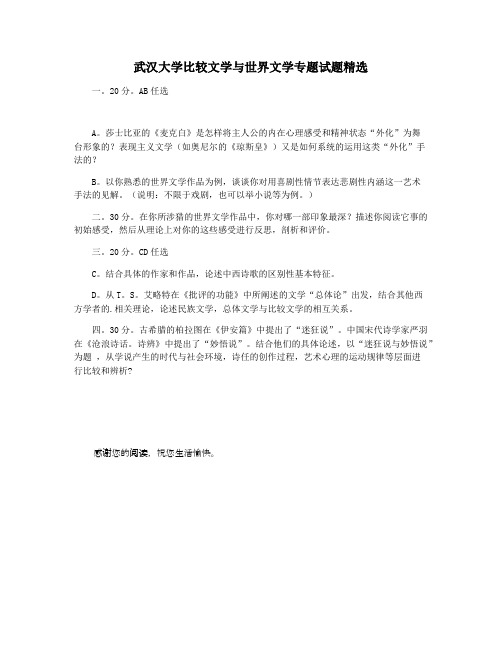
武汉大学比较文学与世界文学专题试题精选一。
20分。
AB任选
A。
莎士比亚的《麦克白》是怎样将主人公的内在心理感受和精神状态“外化”为舞
台形象的?表现主义文学(如奥尼尔的《琼斯皇》)又是如何系统的运用这类“外化”手
法的?
B。
以你熟悉的世界文学作品为例,谈谈你对用喜剧性情节表达悲剧性内涵这一艺术
手法的见解。
(说明:不限于戏剧,也可以举小说等为例。
)
二。
30分。
在你所涉猎的世界文学作品中,你对哪一部印象最深?描述你阅读它事的初始感受,然后从理论上对你的这些感受进行反思,剖析和评价。
三。
20分。
CD任选
C。
结合具体的作家和作品,论述中西诗歌的区别性基本特征。
D。
从T。
S。
艾略特在《批评的功能》中所阐述的文学“总体论”出发,结合其他西
方学者的.相关理论,论述民族文学,总体文学与比较文学的相互关系。
四。
30分。
古希腊的柏拉图在《伊安篇》中提出了“迷狂说”。
中国宋代诗学家严羽在《沧浪诗话。
诗辨》中提出了“妙悟说”。
结合他们的具体论述,以“迷狂说与妙悟说”为题,从学说产生的时代与社会环境,诗任的创作过程,艺术心理的运动规律等层面进
行比较和辨析?
感谢您的阅读,祝您生活愉快。
武大比较文学与世界文学考研
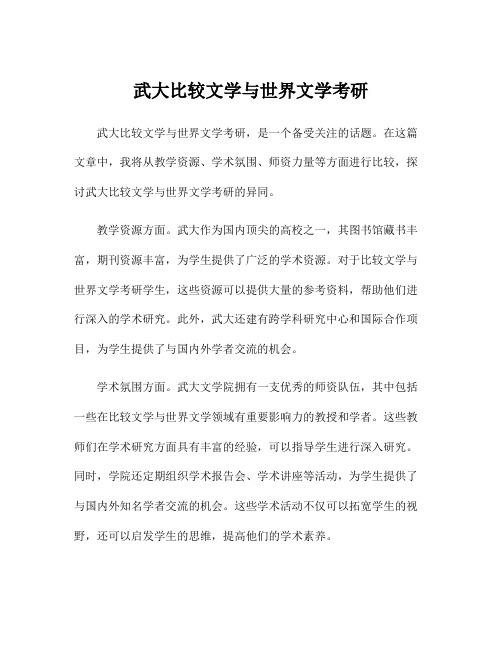
武大比较文学与世界文学考研武大比较文学与世界文学考研,是一个备受关注的话题。
在这篇文章中,我将从教学资源、学术氛围、师资力量等方面进行比较,探讨武大比较文学与世界文学考研的异同。
教学资源方面。
武大作为国内顶尖的高校之一,其图书馆藏书丰富,期刊资源丰富,为学生提供了广泛的学术资源。
对于比较文学与世界文学考研学生,这些资源可以提供大量的参考资料,帮助他们进行深入的学术研究。
此外,武大还建有跨学科研究中心和国际合作项目,为学生提供了与国内外学者交流的机会。
学术氛围方面。
武大文学院拥有一支优秀的师资队伍,其中包括一些在比较文学与世界文学领域有重要影响力的教授和学者。
这些教师们在学术研究方面具有丰富的经验,可以指导学生进行深入研究。
同时,学院还定期组织学术报告会、学术讲座等活动,为学生提供了与国内外知名学者交流的机会。
这些学术活动不仅可以拓宽学生的视野,还可以启发学生的思维,提高他们的学术素养。
师资力量方面。
武大文学院在比较文学与世界文学领域拥有一批高水平的教师,他们熟悉国内外文学研究的前沿动态,对于相关的理论和方法有着深入的研究和独到的见解。
这些教师们既具有丰富的学术经验,又具备较强的教学能力。
他们能够为学生提供专业的指导和个性化的辅导,使他们在考研过程中获得更好的成绩。
综上所述,武大比较文学与世界文学考研在教学资源、学术氛围、师资力量等方面都具有很大的优势。
这些优势可以为学生提供良好的学术环境和资源支持,帮助他们顺利完成学业,并为将来的学术研究打下坚实的基础。
因此,如果你对比较文学与世界文学有浓厚的兴趣和研究欲望,武大的考研专业是一个很好的选择。
但是,考生在选择学府时应根据自己的兴趣、实力和发展需求做出合适的决策。
希望这篇文章对考生们有所帮助。
武汉大学比较文学与世界文学复试经验

武汉大学比较文学与世界文学复试经验复试结果已出,确定被录取,没有太多激动。
相比最后的结果,我倒觉得整个考研学习的过程更让人回味。
下面说说复试的过程。
琐碎细节跳过,直陈三大部分。
首先是笔试。
笔试统一被安排在26号早上7:40~9:40,时间赶紧,共四道论述大题。
1、比较米彻尔的《飘》和曹雪芹的《红楼梦》。
2、比较马尔克斯的《百年孤独》和莫言的《丰乳肥臀》的叙事艺术。
3、谈谈古希腊神话中的悲剧精神,试与中国神话略作比较。
4、哈罗德·布鲁姆的《西方正典》中讲到:“莎士比亚和但丁是经典的中心,因为他们在认知的敏锐、语言的活力和创造的才情上都超过所有其他西方作者。
”如何看待这句话,说说你的见解。
只有一张8开的横格正反面答题纸,两个小时基本写满。
说句实话,我对现当代的作品看的不多,莫言虽然获得诺奖,《丰乳肥臀》我没有看过,只是先前看过一些相关评论,只能结合着说一说。
第三、四两题是我重点答的,因为先前知道武大比较文学专业用《西方正典》(第四题见该书“贵族时代”第一章节“经典的中心:莎士比亚”)作为研究生教材,所以一直对这本书有关注,复试时候也带着该书,这道题答得还不错。
其次是英语面试。
面试分两拨,上午一拨48人,下午又一拨。
我是上午拨第45个。
先前有准备过自我介绍的内容,但是听前面同学出来说问到什么互联网、区域性贫困等问题,有的根本无自我介绍,直接就把自己准备的本子扔了和周围同学聊天缓解压力,轮到我进去,屋里坐着一位老师,一位研究生助理书记员,good morning,sir鞠躬坐下,老师开始发问:1、What do you think of the major you chose.2、What do you think of the Bible.3、What do you think of philosophy.看起来是不是很坑爹?什么家乡、家庭、学校、爱好、读研原因计划都没问到。
其实,这跟我回答的内容有关。
2013武汉大学文学院复试
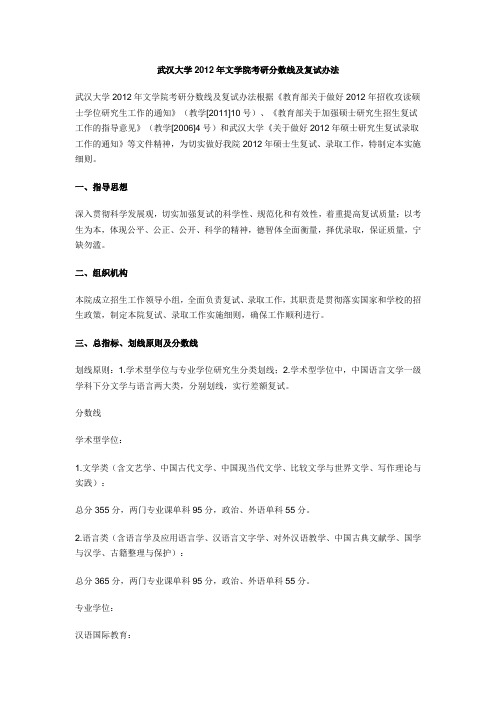
武汉大学2012年文学院考研分数线及复试办法武汉大学2012年文学院考研分数线及复试办法根据《教育部关于做好2012年招收攻读硕士学位研究生工作的通知》(教学[2011]10号)、《教育部关于加强硕士研究生招生复试工作的指导意见》(教学[2006]4号)和武汉大学《关于做好2012年硕士研究生复试录取工作的通知》等文件精神,为切实做好我院2012年硕士生复试、录取工作,特制定本实施细则。
一、指导思想深入贯彻科学发展观,切实加强复试的科学性、规范化和有效性,着重提高复试质量;以考生为本,体现公平、公正、公开、科学的精神,德智体全面衡量,择优录取,保证质量,宁缺勿滥。
二、组织机构本院成立招生工作领导小组,全面负责复试、录取工作,其职责是贯彻落实国家和学校的招生政策,制定本院复试、录取工作实施细则,确保工作顺利进行。
三、总指标、划线原则及分数线划线原则:1.学术型学位与专业学位研究生分类划线;2.学术型学位中,中国语言文学一级学科下分文学与语言两大类,分别划线,实行差额复试。
分数线学术型学位:1.文学类(含文艺学、中国古代文学、中国现当代文学、比较文学与世界文学、写作理论与实践):总分355分,两门专业课单科95分,政治、外语单科55分。
2.语言类(含语言学及应用语言学、汉语言文字学、对外汉语教学、中国古典文献学、国学与汉学、古籍整理与保护):总分365分,两门专业课单科95分,政治、外语单科55分。
专业学位:汉语国际教育:总分320分,两门专业课单科90分,政治、外语单科50分。
教育硕士·学科教学(语文):总分300分,两门专业课单科90分,政治50分,外语40分。
四、复试内容和形式复试含三部分:1、专业课笔试科目以招生专业目录上确定的“复试笔试科目”为准,考试时间2小时,满分为100分。
2、综合面试考察专业知识、综合素质和培养潜力,以抽题和随机提问的方式进行。
要有详细记录,当场给出评语和分数,满分为100分。
武汉大学考研复试内容-复试参考书目-复试准备-复试资料【范本模板】
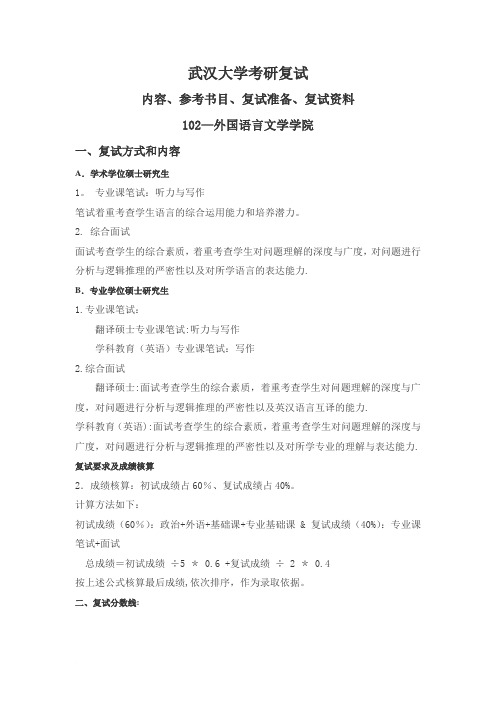
武汉大学考研复试内容、参考书目、复试准备、复试资料102—外国语言文学学院一、复试方式和内容A.学术学位硕士研究生1。
专业课笔试:听力与写作笔试着重考查学生语言的综合运用能力和培养潜力。
2. 综合面试面试考查学生的综合素质,着重考查学生对问题理解的深度与广度,对问题进行分析与逻辑推理的严密性以及对所学语言的表达能力.B.专业学位硕士研究生1.专业课笔试:翻译硕士专业课笔试:听力与写作学科教育(英语)专业课笔试:写作2.综合面试翻译硕士:面试考查学生的综合素质,着重考查学生对问题理解的深度与广度,对问题进行分析与逻辑推理的严密性以及英汉语言互译的能力.学科教育(英语):面试考查学生的综合素质,着重考查学生对问题理解的深度与广度,对问题进行分析与逻辑推理的严密性以及对所学专业的理解与表达能力. 复试要求及成绩核算2.成绩核算:初试成绩占60%、复试成绩占40%。
计算方法如下:初试成绩(60%):政治+外语+基础课+专业基础课 & 复试成绩(40%):专业课笔试+面试总成绩=初试成绩÷5 * 0.6 +复试成绩÷ 2 * 0.4按上述公式核算最后成绩,依次排序,作为录取依据。
二、复试分数线:1、学术学位基本复试分数线:英语语言文学专业、俄语语言文学专业、德语语言文学专业、法语语言文学专业基本复试分数线:总分:355分;政治55分、二外 60分、专业课、95分采取差额复试日语语言文学专业基本复试分数线:总分:385分;政治55分、二外 60分、专业课、95分采取差额复试外国语言学及应用语言学基本复试分数线:总分:370分;政治55分、二外60分、专业课、95分采取差额复试2、专业学位硕士基本复试分数线:总分:370分;政治60分、二外60分、专业课、100分采取差额复试今年我院招生总数为125人,其中学术学位研究生75人,专业学位50人(学术学位推免生24人,专业硕士推免生8人)103—新闻与传播学院一、复试方式和内容1.专业综合课笔试.按2013年招生简章的要求进行专业课的笔试,考试时间为2小时,满分为100分。
武大比较文学复习

跨专业报考武汉大学文学院文学类考研经验逛考研论坛考武汉大学文学院比较文学与世界文学专业,初试成绩是:英语69,政治78,古代文学与外国文学122,现当代文学与文学理论113,总分382,列本专业第一。
复试后还是第一。
先将专业课的部分说下,后若有空,将政治和英语也写出来:古代文学袁行霈版《中国文学史》先通读两遍,然后背目录,背完目录大体框架就心里有数了,比如司马迁的风格,目录里面写得很明确,大的方向一、二、三等等,花点功夫背下来,然后做齐鲁书社版的题目,巩固,当然还有一本书就是网上盛传的《古典文学三百题》,上海古籍出版社的,那本书800多页,可以当做工具书去查,我是在网上下的电子版,有时间就拿出来翻看一下,当然这其中还背了大概200首诗词,都是结合书籍来背的,比如讲唐五代词的发展,从初创时期李白的《忆秦娥》、《菩萨蛮》一直到花间词人,李煜的词,这期间可以挑选词,结合书本背下来,那么,这段时期的知识点不管怎么考,都不怕。
背了诗词的好处很多,比如今年有一道考题是就《采薇》的题目举例说明古典文学中对照手法的运用,这个题目不举例肯定拿不到高分,我举的例子是纳兰性德的《山花子》,而不是读过高中文科可能都知道的苏轼的《江城子》,这就需要一定的诗词基础做底子,不然大家都是举同一个例子,区别度显现不出来。
这些我都完成后还剩下一定的时间,就稀稀落落的看过葛晓音《唐诗宋词十五讲》(这本书写得非常好,里面的诗词除去李白的古诗和个别的诗词外,其余的基本上都要能背下来)。
周先慎的《古代文学十五讲》(这本书可以和《古代文学史》结合来看,作者和袁行霈都是北大的,但是以专题性质,讲解比较深入一点),周先慎的《明清小说导读》(因为武大喜欢出明清小说,可以结合武大相关老师的论文一起看),王晓明《万月之川》(看了这本书可以我当时就把张若虚的《春江花月夜》给背下来了)。
王国维《人间词话》(大师经典之作,通读三遍以上,最好能背一部分,还结合中国古代文论王国维部分去看)。
- 1、下载文档前请自行甄别文档内容的完整性,平台不提供额外的编辑、内容补充、找答案等附加服务。
- 2、"仅部分预览"的文档,不可在线预览部分如存在完整性等问题,可反馈申请退款(可完整预览的文档不适用该条件!)。
- 3、如文档侵犯您的权益,请联系客服反馈,我们会尽快为您处理(人工客服工作时间:9:00-18:30)。
武汉大学比较文学与世界文学复试经验
分享
复试结果已出,确定被录取,没有太多激动。
相比最后的结果,我倒觉得整个考研学习的过程更让人回味。
下面说说复试的过程。
琐碎细节跳过,直陈三大部分。
首先是笔试。
笔试统一被安排在26号早上7:40~9:40,时间赶紧,共四道论述大题。
1、比较米彻尔的《飘》和曹雪芹的《红楼梦》。
2、比较马尔克斯的《百年孤独》和莫言的《丰乳肥臀》的叙事艺术。
3、谈谈古希腊神话中的悲剧精神,试与中国神话略作比较。
4、哈罗德·布鲁姆的《西方正典》中讲到:“莎士比亚和但丁是经典的中心,因为他们在认知的敏锐、语言的活力和创造的才情上都超过所有其他西方作者。
”如何看待这句话,说说你的见解。
只有一张8开的横格正反面答题纸,两个小时基本写满。
说句实话,我对现当代的作品看的不多,莫言虽然获得诺奖,《丰乳肥臀》我没有看过,只是先前看过一些相关评论,只能结合着说一说。
第三、四两题是我重点答的,因为先前知道武大比较文学专业用《西方正典》(第四题见该书“贵族时代”第一章节“经典的中心:莎士比亚”)作为研究生教材,所以一直对这本书有关注,复试时候也带着该书,这道题答得还不错。
其次是英语面试。
面试分两拨,上午一拨48人,下午又一拨。
我是上午拨第45个。
先前有准备过自我介绍的内容,但是听前面同学出来说问到什么互联网、区域性贫困等问题,有的根本无自我介绍,直接就把自己准备的本子扔了和周围同学聊天缓解压力,轮到我进去,屋里坐着一位老师,一位研究生助理书记员,good morning,sir鞠躬坐下,老师开始发问:
1、What do you think of the major you chose.
2、What do you think of the Bible.
3、What do you think of philosophy.
看起来是不是很坑爹?什么家乡、家庭、学校、爱好、读研原因计划都没问到。
其实,这跟我回答的内容有关。
第一个问题我的回答是首先我对比较文学感兴趣,原因之于我的本科专业——对外汉语,在和外国学生和朋友的交流中,我发现了一些难以理解的问题,因此想做深入研究,研究不同国家、文化、文明之间的差异性。
后来我才知道面试的老师张延成副教授是搞对外汉语研究的,在国外当了一年孔子学院院长回来的,本专业嘛,固然要多问问,从而引出第二、三个问题。
我的回答总体还算流畅,因而成绩也不错。
第三部分是面试。
面试首先是抽签排序,剩给我的是第一号,我很满意(早死早超生)。
然后,我们参加复试的五个人进去和每位老师见个面,赵老师分作介绍其他四位老师,五位老师围坐一张四方桌的三边,考生坐在背对门的剩下一边,面对录像镜头,正面对坐着张箭飞老师。
接着抽题。
比较文学、外国文学各一道。
我的题目是:
1、谈谈比较文学媒介学的研究方法。
2、关于诗人里尔克
(1)谈谈其人其诗。
(2)选择你最喜欢的一句或者一篇赏析之。
我点比较背,里尔克是谁,天知道,当时面试直陈不知道,没看过。
我是第一个答题,因此有比较充分的时间准备(后面的人都是在前一个进去答题的时候抽题准备,其准备时间就是前一个人答题的时间,二十分钟左右,可翻书查阅),我只好启动我的第一套应急预案:重点答比较文学题目,再使出我的杀手锏——本科期间发表的论文。
这里牵扯到我的本科经历。
本人本科就读于某部属211高校,本科期间曾主持申请过两次校级本科生科研项目,是有关比较文学的,这也是我选择其作为考研专业的原因之一,有一篇重要期刊的第一作者论文发表。
我先期做好了准备,打印数分。
一进去先是鞠躬,自我介绍,讲本科科研经历,分发论文。
这时我发现,赵老师和张老师在比较仔细地看,涂老师和汪老师则在认真听我回答第一道题。
我答完后,汪老师先是发话,说你答的很全面很详细,随后揪出了我表述不严谨的一个关于浮士德的问题,紧接着一言不发的涂老师问我20世纪还有一部关于浮士德的著作请问是什么,我说托马斯·曼的《浮士德博士》,涂说,嗯,对。
当下赵、张看罢论文,汪、涂拿起论文翻看。
张问了我一个文中的引用文献,是一部英文文献(当时引用是为装×,不想此时露馅),问我是否读过其他的相关书,我还没说NO,赵帮我打圆场:这是个引用文献嘛,本科生写出这样的文章不容易。
涂看罢我的论文问我为什么选择这个题,我详述本科科研经历,涂未发言,赵说这个选题非常不错。
最后,涂问大家还有问题否,没有,结束,鞠躬退场。
以上是我面试的整个过程。
有几个问题值得深究。
第一、扎实的基础是及其重要的,这是你应付老师狂轰滥炸的根本,此取决于你的初试准备和复试冲刺以及平时积累。
第二、不会就直说不会,千万不可不懂装懂,这样的好处是老师觉得你很诚实,坏处是影响你的得分。
很无奈吧,点背怪谁。
第三,有科研经历的本科相当有用,但是前提是经过自己的努力获得一些算不得真理性的认识,代写代发就免了,张老师、涂老师的问题某种程度其实就是在检验我论文的真伪。
其他细节不在赘述。
总体而言,复试算不得走过场,既需要扎实的基本功,又需要相当的运气。
要问我运气如何,我只能说我最大的运气是初试分高,即便面试欠佳,我也能稳居总评第一,这也是我三个过程下来从容自信,一点也不紧张的根本保证。
